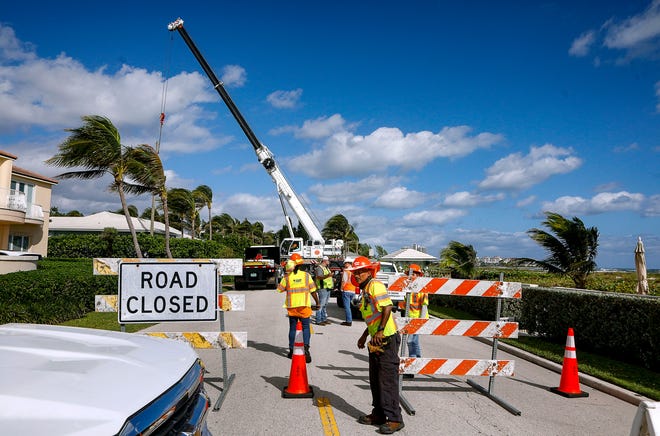The city’s legal battle with an owner of Palm Beach Towers who questioned his plan to evaluate the building’s owners in order to pay for the island-wide burying of overhead lines may be nearing its end.
In a ruling passed last month, the U.S. Court of Appeals for the 11th Circuit upheld a 2018 District Court ruling that included the city’s motion for a summary judgment on the property’s due process and claims to equal protection, as well as the motion legal claims have been approved for dismissal of all states, with the exception of one claim providing for an unconstitutional tax.
That lawsuit was sent back to the District Court, despite judges finding it could land in a state court.
“Since the federal lawsuits were duly dismissed, the district court can refuse to exercise additional jurisdiction over this pre-trial detention suit,” the judges wrote. “This is a way for the Florida courts to interpret their own constitution and statutes.”
PBT Real Estate LLC, based in the Towers building at 44 Cocoanut Row, took the view that the owners of the 273 units at Palm Beach Towers should not be ordered to pay the subsoil because their utilities are already buried.
The company filed a lawsuit in the Palm Beach County Circuit Court in 2017, indicting the city, Palm Beach County’s real estate appraiser Dorothy Jacks, and Palm Beach County’s tax collector Anne Gannon as the defendants.
The Towers board of directors said they were not involved in the lawsuit.
More:Palm Beach: Utility funeral costs soar to $ 120 million
The city moved the case to a district court after PBT Real Estate amended its complaint to change the obligation of owners and other condominium owners to pay the special assessments of their fourteenth amendment rights to due process and equal protection of the law violate and would violate Florida state law.
Both sides agreed that the utilities on the towers prior to the citywide project were underground and separate from this project.
However, Judge Donald M. Middlebrooks said in his June 2018 ruling in the U.S. District Court for the Southern District of Florida that the city had shown it was considering factors other than whether a package was already serving its utilities in determining ratings had gone underground.
The valuation method took into account the improved aesthetics, safety and service reliability that any property would receive if all overhead, cable television and telephone lines were buried across the city.
Other properties in the city that had already buried their utilities through small underground projects were excluded from ratings for the citywide project. But these plots, unlike the towers, have already been valued using the same method imposed elsewhere in the city, Middlebrooks wrote in his decision to uphold the city’s motion for a judgment without trial.
PBT Real Estate appealed the decision to the US Court of Appeals, which issued its decision on February 22nd.
John D. O’Neill, a lawyer and resident of West Palm Beach who is registered as a representative for PBT Real Estate, would not comment on the ruling. City lawyers could not be reached.
The city has spent $ 946,316 defending itself against the PBT Real Estate lawsuit and two other lawsuits against the Undergrounding Assessment Plan, finance director Jane Le Clainche told the Daily News last month. Of this, USD 159,408 related to the PBT Real Estate case.
The city spent $ 183,701 to defend itself against a lawsuit by South End-based Arthur Goldmacher, who challenged a 2016 referendum that saw voters close a $ 90 million bond to fund the utility project approved.
In March 2018, Florida’s fourth district appeals court in West Palm Beach upheld Judge Cymonie Rowe’s dismissal of Goldmacher’s lawsuit.
Goldmacher alleged in the lawsuit that the voting language of the referendum was misleading because it appeared that property taxes, rather than assessments, were the primary means of repaying the bonds.
Rowe noted that the language used was not misleading, inconsistent, and did not violate any law.
The city has spent $ 603,207 defending itself against a third lawsuit
Michael Scharf, owner of a single family home in the North End, and Carol Kosberg, owner of a condo in the South End, claimed the ratings were invalid because the city relied on a consultant’s “arbitrary rating method”.
A judge denied his request for a certificate of class action in November 2019. An appeal against this ruling was denied in January, and Kosberg and Scharf resigned themselves to the city during a council meeting on March 3.
However, the case was dismissed with prejudice two days later, and each side agreed to pay their respective attorneys’ fees and expenses.
“The city is pleased to leave this case behind us and focus our energies on completing the project,” said city administrator Kirk Blouin on Monday.
The burial of all power, cable television and telephone lines will be gradual as part of a nine-year plan that began in 2017.
Construction costs were revised upwards from USD 103 million to USD 120 million at the end of 2019.
@ JRWagner5
